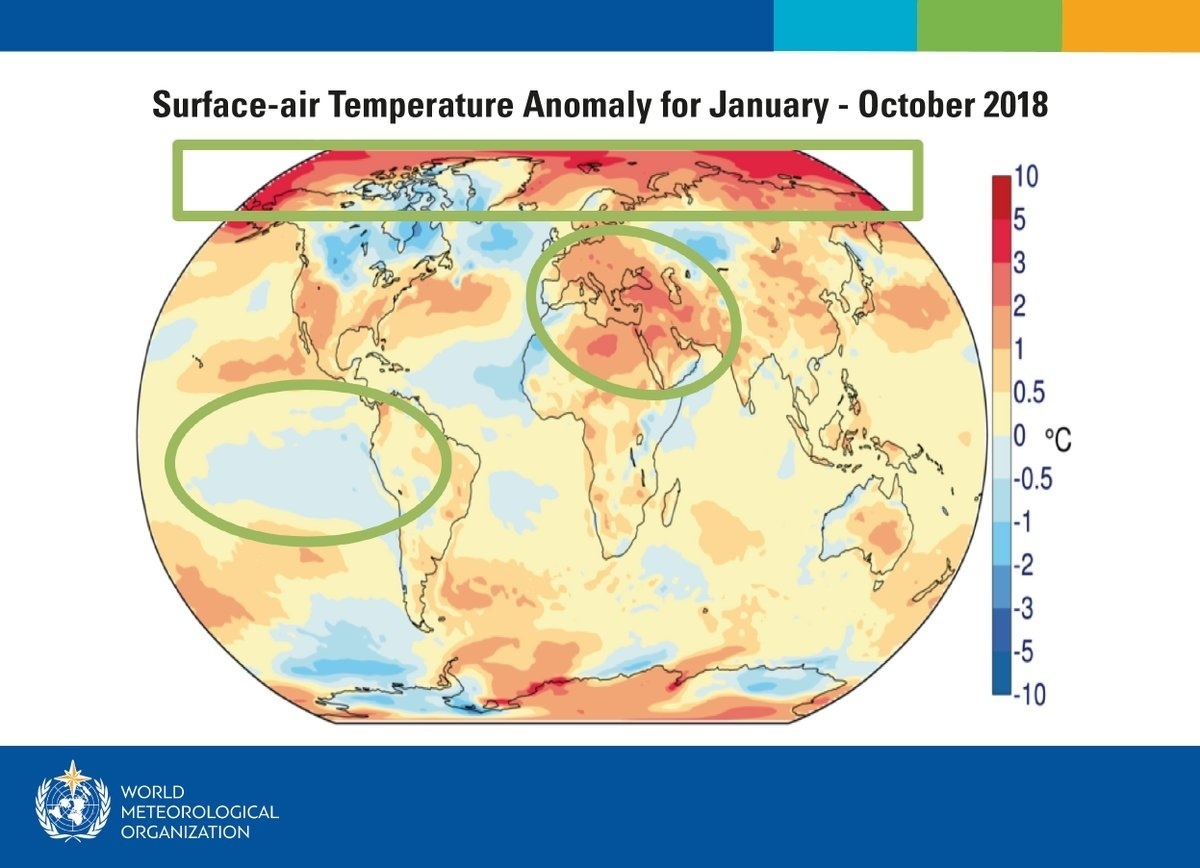

2018 is set to be the fourth warmest year on record. @WMO / Twitter
2018 will likely be the fourth hottest year on record, according to the United Nations’ authoritative voice for weather and climate. The three years that were warmer? 2016, 2015 and 2017.
Furthermore, the 20 warmest years on record have been in the past 22 years, the World Meteorological Organization (WMO) said Thursday in its 2018 State of the Climate report.
Long-term #climatechange continued in 2018. Average global temperature set to be 4th highest on record, nearly 1°C above pre-industrial era. 20 warmest years on record have been in the past 22 years, with the top 4 in the past 4 years: new WMO #StateofClimate report #COP24 pic.twitter.com/yiNz1yjzUI
— World Meteorological Organization (@WMO) November 29, 2018
The new report, based on five independently maintained global temperature data sets, adds ever more proof that global warming is unequivocal—and we’d better act now to reverse this alarming trend.
Unfortunately, the current pace of international government action is “insufficient” to limit warming, the UN Environment Programme warned yesterday in its 2018 Emissions Gap Report. In fact, the annual assessment found that after a three-year decline, heat-trapping greenhouse gas emissions actually increased to “historic levels” of 53.5 billion tonnes in 2017, with no signs of peaking.
“We are not on track to meet climate change targets and rein in temperature increases,” WMO Secretary-General Petteri Taalas said today in a press release. “Greenhouse gas concentrations are once again at record levels and if the current trend continues we may see temperature increases 3-5°C by the end of the century.”
https://twitter.com/WMO/statuses/1068082138736730112
Taalas stressed that exploitation of fossil fuels will push temperature rise “considerably higher.”
“It is worth repeating once again that we are the first generation to fully understand climate change and the last generation to be able to do something about it,” he said.
Scientists have already warned that 2019 could be an unusually warm year due to a forecasted El Niño, which could cause extreme weather and temperature spikes.
There is a 75-80 percent chance of an El Niño developing by February. @hausfath @WMO #ClimateAction #COP https://t.co/KReKev0woA
— EcoWatch (@EcoWatch) November 28, 2018
The new State of the Climate report shows that temperatures for the first ten months of 2018 were nearly 1°C above the pre-industrial baseline from 1850-1900.
Last month’s widely disseminated climate report from the Intergovernmental Panel on Climate Change showed that average global temperatures between 2006-2015 were 0.86°C above the pre-industrial baseline. In the last five years, 2014-2018, it was 1.04°C above the pre-industrial baseline.
“These are more than just numbers,” said WMO Deputy Secretary-General Elena Manaenkova in today’s press release.
“Every fraction of a degree of warming makes a difference to human health and access to food and fresh water, to the extinction of animals and plants, to the survival of coral reefs and marine life,” she added. “It makes a difference to economic productivity, food security, and to the resilience of our infrastructure and cities. It makes a difference to the speed of glacier melt and water supplies, and the future of low-lying islands and coastal communities. Every extra bit matters.”
The WMO report comes just days before the critical climate summit COP24 in Katowice, Poland, where delegates from roughly 200 countries will create a “rulebook” on how to implement the 2015 Paris agreement to avoid disastrous climate change.
The Paris accord aims to keep global temperature rise this century to well below 2°C above pre-industrial levels and has a more aspirational target to limit temperature rise to 1.5°C.
The U.S. government released a report that warned climate change could kill thousands of Americans each year and slash the GDP by more than 10 percent by 2100. #SMH https://t.co/Yeik3hE2dn
— EcoWatch (@EcoWatch) November 27, 2018

 233k
233k  41k
41k  Subscribe
Subscribe 